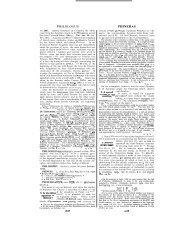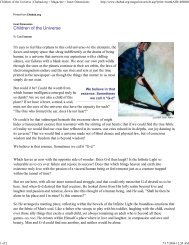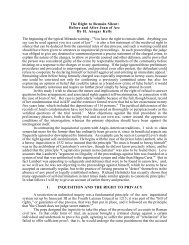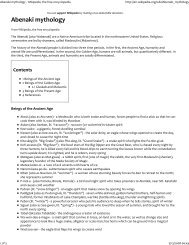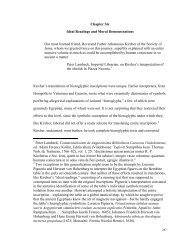sefi;g:v. - A Kabbalist walks into a bar, and the
sefi;g:v. - A Kabbalist walks into a bar, and the
sefi;g:v. - A Kabbalist walks into a bar, and the
You also want an ePaper? Increase the reach of your titles
YUMPU automatically turns print PDFs into web optimized ePapers that Google loves.
SELEUCIDE SELEUCIDA<br />
<strong>the</strong> Syrian throne ; ALEXANDER (4.”. , 2) made himself<br />
out to be a son of Antiochus Epiphanes.<br />
Alex<strong>and</strong>er Bala appeared at an opportune moment, as Demetrius<br />
had completely alienated his subjects by his tyranny <strong>and</strong><br />
excesses (153 B.c.) whilst at <strong>the</strong> same time he had gwen way to<br />
love of drink, <strong>the</strong> Aereditary vice of his house (Polyb. 33 19). In<br />
addition to this, an attempt to secure <strong>the</strong> isl<strong>and</strong> of Cyprus by<br />
treachery had indeed failed, but had earned <strong>the</strong> Syrian monarchy<br />
<strong>the</strong> hostility of Ptolemy Philometor (Polyb. 33 5). The result<br />
was that, though a party at Rome (perhaps that of <strong>the</strong> Scipios)<br />
was favourably inclined to Demetrius, <strong>the</strong> Roman Senate, upon<br />
grounds of policy, <strong>and</strong> also upon more sordid grounds, was<br />
mduced to recognise <strong>the</strong> impostor Alex<strong>and</strong>er (Polyb. 33 IS) who<br />
was also supported by Attalus Ariara<strong>the</strong>s <strong>and</strong> Ptolemy $‘hilometor.<br />
Consequently, in 153 B.c., Alex<strong>and</strong>er appeared with an<br />
army in Syria.<br />
Both Demetrius <strong>and</strong> Alex<strong>and</strong>er made bids for <strong>the</strong><br />
favour of <strong>the</strong> Jews, who were now under Jonathan<br />
(I Macc. lor$). The king recalled his garrisons from<br />
all <strong>the</strong> towns except Jerusalem <strong>and</strong> Beth-zur, <strong>and</strong> gave<br />
Jonathan power to raise an army <strong>and</strong> to liberate <strong>the</strong><br />
hostages. The various taxes <strong>and</strong> royal claims upon <strong>the</strong><br />
Jews were also remitted (see <strong>the</strong> instructive list given in<br />
Jos. Ant. xiii. 2zf:).l The impostor, however, was<br />
more successful in appealing to Jonathan’s personal<br />
ambition, nominating him high-priest, <strong>and</strong> sending him<br />
<strong>the</strong> insignia of royalty, with <strong>the</strong> title of ‘king’s friend ’<br />
(cp FRIEND). The decisive battle was fought in 150<br />
B.c., <strong>and</strong> Demetrius fighting heroically was slain<br />
(Justin, 351, Polyb. 35, Jos. Ant. xiii. 24). In spite<br />
of <strong>the</strong> fragmentary <strong>and</strong> obscure character of <strong>the</strong> record,<br />
we may well doubt whe<strong>the</strong>r this Demetrius was not one<br />
of <strong>the</strong> most gifted of <strong>the</strong> Selencid dynasty (v. Gutschmid,<br />
Iran, 43).<br />
Demetrius 11.. Nicator (145-139 <strong>and</strong> 129-125 B.c.),<br />
<strong>the</strong> elder of <strong>the</strong> two sons of Demetrius I.. had been sent<br />
12.DemetriueII. by his fa<strong>the</strong>r for protection to<br />
(&et reign :<br />
145-139 B.D.r<br />
Cnidus when Alex<strong>and</strong>er invaded<br />
Syria (Justin, %z), <strong>and</strong> remained<br />
<strong>the</strong>re for some years in exile until he<br />
became aware that <strong>the</strong> usurper had forfeited <strong>the</strong> goodwill<br />
of his subjects by his negligence of state affairs <strong>and</strong> his<br />
self-indulgence (Livy, E@. 50). In 147 B.C. he l<strong>and</strong>ed<br />
on <strong>the</strong> Ciliciau coast with a force of Cretan mercenaries<br />
(I Macc. 1067). Ptoleniy VI. Philometor had given<br />
his daughter Cleopatra Thea (‘one of <strong>the</strong> most<br />
impudent women produced by <strong>the</strong> Ptolemy line, which<br />
had no lack of such characters,‘ Holm, Grk. Hz’rt.<br />
44’7) in marriage to Alex<strong>and</strong>er, <strong>and</strong> at first came to his<br />
assistance, but afterwards transferred his favour to<br />
Demetrius II., to whom also he transferred his daughter.<br />
Ptolemy’s voZfe-fue was accounted for by a story that Alex-<br />
<strong>and</strong>er had attempted his life (. Macc. 11 IO); but <strong>the</strong> true motive<br />
was probably <strong>the</strong> desire to take advantage of <strong>the</strong> intestine strife<br />
to annex at least Palestine <strong>and</strong> Ccelesyria (I Macc. 11 I).<br />
According to Jose hus (Ant.xiii. 45f:), Ptolemy actually at<br />
Antioch assumed tEe ‘diadem of Asia’ (so also I Macc. 11 sf:,<br />
where, however, <strong>the</strong> motive assigned for Ptolemy’s conduct<br />
differs). On this episode, see Mahaffy, Em?. of<strong>the</strong> PtoZemies,<br />
364f:<br />
The opportune death of <strong>the</strong> Egyptian king on <strong>the</strong><br />
third day after he had gazed upon <strong>the</strong> severed head of<br />
Alex<strong>and</strong>er Balas, removed a formidable rival from <strong>the</strong><br />
path of Demetrius (I Macc. 11 18 ; was he murdered ?<br />
Straho, 751, says that he died from a wound received<br />
in <strong>the</strong> battle on <strong>the</strong> CEnoparas, near Antioch. fighting<br />
against Alex<strong>and</strong>er). Having thus won hack his fa<strong>the</strong>r’s<br />
kingdom by arms he received <strong>the</strong> title Nicator (‘ Conqueror’<br />
; Appian, Syr. 67, 5s v68ov TOO y&ms lfvspa<br />
vtK4uas).z The entire country, in fact, had rallied to<br />
him, with <strong>the</strong> exception of Judzea, where <strong>the</strong> ambitious<br />
Jonathan had inflicted defeat upon his adherent Apollonius,<br />
governor of Coelesyria (I Macc. 10 @ f: ).<br />
Denietrius was, indeed, fain to purchase <strong>the</strong> acquiescence<br />
of Jonathan by confirming him in <strong>the</strong> high-priesthood,<br />
<strong>and</strong> by <strong>the</strong> abolition of taxes (I Macc. llzof:), <strong>and</strong><br />
<strong>the</strong> surrender to Jndaea of three Samarian districts.<br />
When peace was assured Demetrius disb<strong>and</strong>ed <strong>the</strong><br />
1 See <strong>the</strong> remarks of Maha@ Em#. of <strong>the</strong> Pfokmies 182 f<br />
a On his coins he also calls hihself Theos <strong>and</strong> Philadilphos.<br />
4355<br />
native troops <strong>and</strong> retained only his Cretan mercenaries.<br />
This led to risings in Antioch, which were put down by<br />
<strong>the</strong> mercenaries with <strong>the</strong> aid of 3000 Jewish troops sent<br />
by Jonathan. Confiscations <strong>and</strong> executions alienated<br />
<strong>the</strong> goodwill of <strong>the</strong> people (I Macc. 1133f.). This<br />
emboldened one Diodotus, a native of Kasiana, brought<br />
up at Apamea on <strong>the</strong> Orontes (Strabo, 752; cp id.<br />
668), to declare a young son of Alex<strong>and</strong>er Bala king as<br />
Antiochus VI. Dionysus.’ This was in 145 B.C. ’The<br />
Jews profited by this revolt, for Demetrius had not<br />
redeemed his promises to withdraw his garrisons from<br />
Judaea. The disb<strong>and</strong>ed troops also rallied to <strong>the</strong><br />
st<strong>and</strong>ard of his rival, <strong>and</strong> Demetrius was compelled to<br />
evacuate Antioch <strong>and</strong> to retire to Seleucia (Livy, Epit.<br />
52) or to Cilicia (so Jos. Ant. xiii. 54). Jonathan <strong>and</strong><br />
his bro<strong>the</strong>r Simon mastered all sou<strong>the</strong>rn Syria (for <strong>the</strong><br />
details of <strong>the</strong> operations, see I Macc. 11 601: ).<br />
Seleucia, near Antioch, remained true to Demetrius,<br />
along - with Cilicia<strong>and</strong> <strong>the</strong> eastern provinces cenerally,* - so<br />
that <strong>the</strong> young Antiochus never ruled<br />
13. Antiochus<br />
over more than a small part of<br />
(146-142 B.C.)<br />
His reign soon came to<br />
anamphon YEid, as he was murdered by<br />
(142-138 B’C’)‘ Diodotus. who usurped <strong>the</strong> throne<br />
under <strong>the</strong> name of Tryphon.<br />
The date is disputed ; probably it was in 143-142 B.C. : so <strong>the</strong><br />
coins (see Babelon Rois de Syrie r31f: <strong>and</strong> cp I Macc. 13 31).<br />
On <strong>the</strong> o<strong>the</strong>r h<strong>and</strong>: according to Jbsephus (Ant. xiii.5 II 7 I) <strong>the</strong><br />
murder of Antiochus occurred affer <strong>the</strong> capture of Demetrius<br />
by <strong>the</strong> Parthians. (On this much disputed point see <strong>the</strong><br />
authorities referred to in Schiir. Ffist. of <strong>the</strong>Jms, ET, i. 1177,<br />
<strong>and</strong> Cambridge Bible, First Book ofM. in 2.c.).<br />
The usurper made himself detested for his cruelties.<br />
Chiefly he alienated <strong>the</strong> sympathies of <strong>the</strong> Jews, <strong>and</strong><br />
earned <strong>the</strong>ir active hatred, by <strong>the</strong> capture <strong>and</strong> execution<br />
of Jonathan when he had all but established <strong>the</strong> inde-<br />
pendence of his country (I Macc. 123gf.).<br />
The three or four years of <strong>the</strong> reign of Tryphon are<br />
almost destitute of incident, save for a few isolated<br />
notices. His headquarters seem to have been at Cora-<br />
cesium in Cilicia Aspera, a robbers’ eyrie on a pre-<br />
cipitous crag by <strong>the</strong> sea. Strabo (668) attributes to<br />
him <strong>the</strong> rise of <strong>the</strong> piratical power in Cilicia, which<br />
afterwards attained such extraordinary dimensions.<br />
The generals of Demetrius, in Mesopotamia <strong>and</strong> Cele-<br />
Syria at least, retained <strong>the</strong>ir ground before those of<br />
Tryphon, whilst Simon, who had succeeded to <strong>the</strong><br />
leadership of <strong>the</strong> Jews (I Macc. 138), entered <strong>into</strong><br />
negotiations with Demetrius, who granted all his<br />
dem<strong>and</strong>s, including even exemption from tribute<br />
(I Macc. 1336f.). Though <strong>the</strong> Jews thus did not gain<br />
absolute independence, but had still to recognise <strong>the</strong><br />
suzerainty of <strong>the</strong> Syrian kings, <strong>the</strong>y adopted a new era,<br />
<strong>and</strong> Simon ruled as ethnarch, or vassal prince (I Macc<br />
13413 ; cp Justin, 361 3):<br />
At this moment <strong>the</strong> attention of Demetrius was diverted to<br />
Babylonia, where he had to face a new peril. Mithridates I. of<br />
Parthia 3 after displaying his power in <strong>the</strong><br />
14. Demetrins E., had conquered Media (147 B.c.), <strong>and</strong><br />
in parthia even Seleucia on <strong>the</strong> Tigris two years later.<br />
(139-129 B.c.). The Babylonians appealed for assistance.<br />
Demetrius was joined by <strong>the</strong> Persians, Ely-<br />
mxans, <strong>and</strong> Bactrians; but jn 139 B.C. he was defeated <strong>and</strong><br />
taken prisoner by <strong>the</strong> Parthiam, <strong>and</strong> carried about through<br />
<strong>the</strong>ir territorie? as a show4 (I Macc. 14 I, Jos. Ant. xiii. 7 I,<br />
Appian, Syr. 67. The actual capture was due to treachery).<br />
For ten years Demetrius remained a prisoner ; but very soon<br />
after his capture his treatment improved, <strong>and</strong> he was even<br />
given <strong>the</strong> king’s daughter Rhodogune to wife. Probably <strong>the</strong><br />
promise of reinqtallation in his kingdom would have been<br />
realised bad not Mithridates himself died, <strong>and</strong> been succeeded<br />
1 The coins of this seven-pear-old king also hear <strong>the</strong> title<br />
Epiphanes. His mo<strong>the</strong>r was <strong>the</strong> Egyptian princess Cleopatra<br />
Thea. In A~~ian. Svr.68. he is wronelv _. called Alex<strong>and</strong>er.<br />
See ANTIOCHGS, 4. ’ .<br />
2 Cp inscr. from Babylon in Zeitschr. f: Assyr.8110, <strong>and</strong><br />
inscr. from Papbos in.fourn. of UeZZeenic Sirhes 9 (1880) 230.<br />
3 Mithridates I. reigned 174-136 B.C. He.calls)himself on his<br />
coins King of Kings <strong>the</strong> Great Arsaces, Epiphanes, Euergetea<br />
Philhellen. He wis <strong>the</strong> mo:t considerable of <strong>the</strong> Parthia;<br />
monarchs.<br />
4 From this circumstance he was called mockingly Seripides<br />
(Eus. Chron. 1256).<br />
4356



